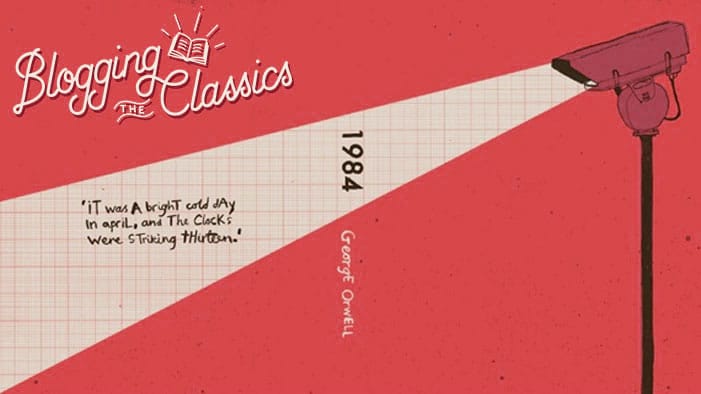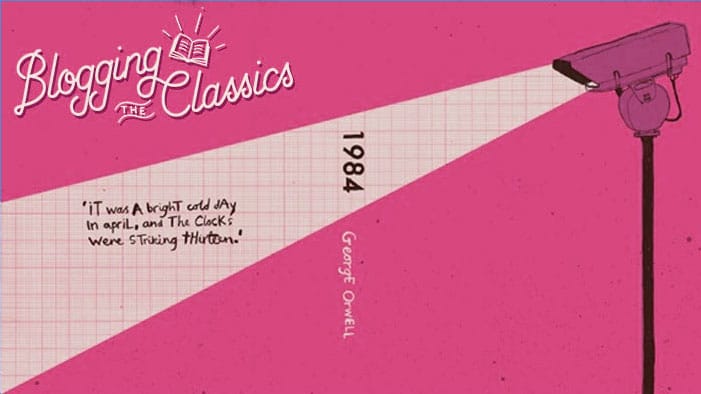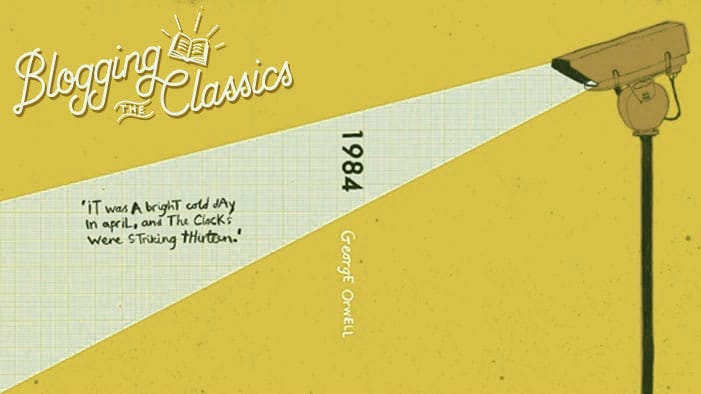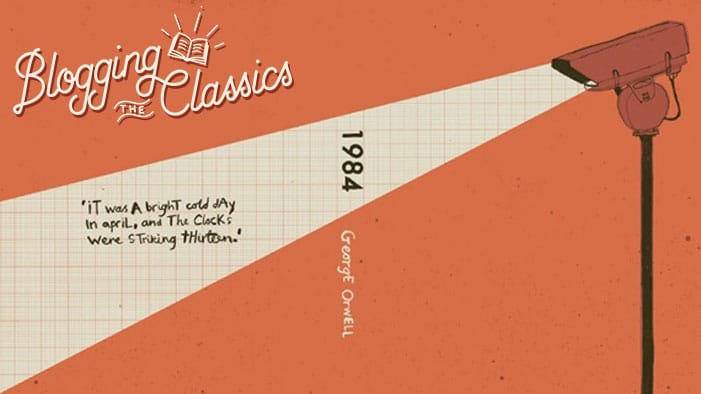Blogging 1984: IV (Part 1, Chapters 6, 7 & 8)

Previously in Blogging 1984, Winston went to work and had the Mondayest of Mondays at minitrue, then pondered proliferation of idiots under the Big Brother regime. This time: sex.
VI
Winston is home Dear-Diaring again when we pick up, and ~bless~ he launches straight into a raunchy tale of prostitution from his past. The woman was “painted” in makeup—in 1948, when Orwell wrote the book, this was clear shorthand for “is a whore,” but in 2016 most often means “works at Sephora”—and she charges two dollars for a tryst in her subterranean prole dwelling.
Winston stops writing to regroup and pound down some of the dissonance dredged up by this problematic memory, suddenly recalling his wife, Katharine. Whoa, wife??? Winston, you old dog!
Katharine is long gone, but it’s unclear if she’s dead, vanished, or has simply been reassigned to another sad, ulcered ministry worker. In any case, we learn she was a tasteless companion/loyal follower of The Party, and assigned to be Winston’s wife by a committee, like all good marriages. The committee’s prescribed purpose is to remove the thrill of eroticism from the institution of marriage. Naturally, this means that “needs” will need to be met in other ways (see: American Pie), but the Party seems not to be worried about the occasional illegal jaunt to Moles Town to perform the horizontal naked dance:
“Mere debauchery did not matter very much, so long as it was furtive and joyless, and only involved the women of a submerged and despised class.”
The Party’s approach to sex ed is, I’d say, fairly well abstinence-until-marriage-and-only-then-for-the-good-of-the-Party. Children are reared believing sex to be “a slightly disgusting minor operation, like having an enema,” and organized into pro-abstinence groups like the Junior Anti-Sex League. Taken to its endpoint, The Party would remove reproduction from sex altogether, and use artificial insemination to further the population.
Why would a government want to wade into reproductive governance? Because, as Gloria Steinem has noted, reproduction determines a nation’s territory and population (“the ability to decide how many workers, how many soldiers, what class, what race and so on.”). It’s a question of economics (if not a question of human rights and freedom).
Imagine, for a second, asking your parents where you came from and being told, “Well, sweetie, after a period in which boot production fell in the nation, The Party decided to boost our worker base through targeted insemination programs and, nine months later, there you were!”
Cute.
Back to Katharine: “she had without exception the most stupid, vulgar, empty mind that he had ever encountered.” To paraphrase, Winston’s ex wife is so vapid, she thinks Pokemon is a style of Korean sushi. She’s so stupid, her zodiac is Idiot with Mercury rising. She’s a dolt. A numpty. A wally.
(George hates idiots.)
Hold onto your garters though, because we are about to get a royal dose of married relations between Winston and Kate. Put on your eye condoms to take in the love scene:
“As soon as he touched her she seemed to wince and stiffen. To embrace her was like embracing a jointed wooden image… She would lie there with shut eyes, neither resisting nor cooperating, but submitting. It was extraordinarily embarrassing, and, after a while, horrifying.”
Wow, team. That wasn’t even all of it.
Katharine and Winston tried to conceive as their “duty to the Party,” and, their naked marionette jig having failed, eventually went their separate ways. It was a no faultsies divorce because the biggest crime of all—-falling in love—had been handily avoided.
Back to the prole den of conjugation: we learn that the lady prostitute was old and had no teeth. Poor Winston “did it anyway.” It’s at once an act of rebellion and also the most depressing thing to happen to my soul since Smashing Pumpkins’ “Disarm.” Of course, for Winston to realize and remark upon the injustice of a world in which humans are denied connection and love, he has to be fully awake. I don’t think there is any stopping his runaway ThoughtCrimeâ„¢ train now.
VII
Old mate Winston isn’t the only person seeing in color: he turns his attentions to the “swarming, discarded masses, 85 percent of the population of Oceania.” I’m actually surprised that the proles represent such a large segment of the population—Winston is a 15-percenter! (Official Marxist terminology: petite bourgeoisie.) In spite of their numbers, the underclass are compliant for the most part, if prone to momentary uprisings and riots.
“They were born, they grew up in the gutters, they went to work at twelve they passed through a brief blossoming period of beauty and sexual desire, they married at twenty, they were middle-aged at thirty, they died, for the most part, at sixty. Heavy physical work, the care of home and children, petty quarrels with neighbours, films, football, beer and, above all, gambling, filled up the horizon of their mind.”
Supposedly, the proles are better off in a system where they are the scunge on the bottom of society and have their freedom than they were under the Capitalists, but if you think about it, the proles probably can’t tell the difference between poverty under a capitalist system and a totalitarian regime (presumably Man-U survived the Revolution). Winston himself isn’t sure whether life is better post-Revolution: “The only evidence to the contrary was the mute protest in your own bones, the instinctive feeling that the conditions you lived in were intolerable and that at some other time they must have been different.”
Winston tries to stir up memories of the Revolution, of the subsequent “purges” in the 1960s, and why must genocidal regimes always use the lingo you’d expect to hear at a colonic centers when they talk about purifying society? By 1970, the other leaders of the Revolution had been singled out and denounced as counter-revolutionaries, leaving Big Brother as the last one standing. Funnily, Winston recalls a moment in which an old newspaper clipping was accidentally sent down his work hole: it acquitted three revolutionaries, Jones, Aaronson, and Rutherford, of the treasonous crimes they had confessed to before being pardoned and installed into decorative (read: powerless) posts within the regime. Winston had seen them at the Chestnut Tree Cafe, that radical anti-Starbucks, post-pardon as a curious song played over the radio:
“Under the spreading chestnut tree
I sold you and you sold me:
There lie they, and here lie we
Under the spreading chestnut tree”
So many Hunger Games vibes right there.
Shortly after this sighting, Jones, Aaronson, and Rutherford were (again) found guilty and executed for treason. Gentle folk music almost always leads to death in totalitarian regimes. Bon Iver wouldn’t have lasted a second under Stalin.
Winston considers the extent of Big Brother’s powers, in being able to exterminate all opposition, in being able to convince a nation of people that there is no such thing as reality: “In the end the Party would announce that two and two made five, and you would have to believe it.”
Our sadsack hero commits himself to preserving the belief that two and two equals four, to holding onto the memory of the dead revolutionaries, and to continuing his Diary effort, which he dedicates here to the sexy, unseen O’Brien.
VIII
After wringing out his soul onto paper, Winston takes an evening walk, blowing off his commitment to appear at the Community Centre in the process—a presumably risky move should the Thought Police have realized he wasn’t down at the Y, and was instead walking moodily through London’s prole slums, committing melancholic Thought Crime left and right.
In fact, the idea that he should use his non-work downtime to do something fun for himself was a crime all of its own called “ownlife.” Sounds like he is #bestlifing it to me.
He is deep into his constitutional, thinking about all the proles in their assorted rags when one warns “Look out, guv’na! Bang over’ead! Lay down quick!” They are alerting him to an incoming rocket, and reminding us at the same time why former commoner and current Duchess of Cambridge Kate Middleton got elocution lessons before wedding young William.
“The proles were nearly always right when they gave you a warning of this kind. They seemed to possess some kind of instinct which told them several seconds in advance when a rocket was coming.”
This is either flattering to the proles, or incredibly dehumanizing, as they register bomb threats with the keen instincts that cause dogs and birds to flee before an earthquake. Surveying the damage, Winston sees a disembodied hand sitting in a pile of rubble and continues on to a district full of pubs. (Proles get pubs?!) Some agitated proles are in an altercation about the Lottery, which Winston tells us is a government ruse to distract and offer hope to the teeming masses—a sort of panem et circenses.
Winston sees an old man bumbling along the street, old enough to remember life before the Revolution. He follows him into a pub and offers to buy him a beer, in hopes that the man will validate his theory that the current day is a dystopian nightmare. Winston tries pressing him on whether or not the Party’s propaganda is true: that life before the Revolution was poverty-stricken and the Capitalists demanded fealty from all the poor. The man answers in cockney jibberish, a “rubbish heap” of conversation (note: the original “dumpster fire”). Frustrated, Winston leaves when the old man gets up to take a piss, and moseys on through the streets, finding himself in front of the junk shop where he bought his Trapper Keeper (diary). He turns in and buys a paperweight from the shop owner, who invites him upstairs to see additional artifacts. Winston is struck by it all, wants the old art prints, the wooden furniture, the lost life.
Back out on the street, he runs into Dystopian Rey, wherein “his heart seemed to turn to ice and his bowels to water.” They pass without exchanging a word and he wonders whether to chase after her and bash her head in with the paperweight, deciding that if she is spying on him, she’s likely too “young and lusty” to be beaten. Instead, he drags his feet back home and diarizes the last of his thoughts before the Thought Police show up.
Notes:
- That is the end of Part 1. George really saved the steamy stuff for last, eh?
2. The quote to underline seems to be “our only hope is the Proles,” who seem to be a class made up entirely of Geri Halliwells. Will the Proles get their stuff together in time to usurp Big Brother?
3. I’m not buying Dystopian Rey from the fiction department as a spy for one second, and predict a future furtive makeout with Winston in the mahogany bed in the junkshop.
4. Just how wrong was George Orwell about the actual 1984? Well he sure as hell didn’t see Ralph Macchio coming.
Read the next installment of Blogging 1984 here!
Find all of Janet’s 1984 blog here, and find our Blogging the Classics index page here.















